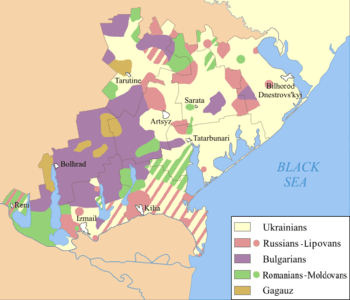Bulgarians in Ukraine
Bulgarians in Ukraine make up the fifth biggest minority in the country and primarily reside in southern Ukraine. Bulgarians make up a significant minority of Odessa Oblast, especially the city of Bolhrad.
Location and number
In Ukraine, the number of Bulgarians is estimated at over 140,000 (the 2001 Ukrainian Census counted a total of 204,600 Bulgarians which includes an undetermined number of more recent emigrants). Bulgarians comprise the majority in Bolhrad District and are prevalent in the district of Budjak in the Odessa Oblast and throughout the southern part of the country. Many Bulgarians have moved to Odessa, the regional capital in recent years.
The Ukrainian Oblasts with the highest number of Bulgarians are:
- Odessa: 150,700 (6.1%)
- Zaporizhzhia: 27,800 (1.4%)
- Mykolaiv: 5,600 (0.4%)
- Donetsk: 4,800 (0.1%)
History
The modern population of Bulgarians settled in the region at the end of the 18th and beginning of the 19th century, at the time of feudal sedition in the Ottoman Empire and after the Russo-Turkish Wars. Particularly significant waves of emigration began after the Russo-Turkish Wars of 1806–1812 and 1828–1829. The settlers came primarily from what is now eastern Bulgaria, but many were also descendants of Bulgarians of the western part of the country that had moved east in and before the 18th century. Among the Bulgarians that emigrated were also a handful of Albanians who also had settled in eastern Bulgaria some time ago.
After arriving, the Bulgarians founded their own towns, such as Bolhrad (1819) and Comrat, and around 64 villages. In 1856, after the Treaty of Paris, the region of Bessarabia was divided with the southwestern parts, including Bolhrad, Izmail and Kilia, incorporated into Moldova (since 1861 – Kingdom of Romania), and the northeastern ones, centered on Comrat, remaining in the Russian Empire. A Bulgarian gymnasium (school) was founded in Bolhrad on 28 June 1858, which had a significant effect on the development of Bulgarian education and culture and was the first modern Bulgarian gymnasium.
In 1861, 20,000 Bulgarians from the Romanian part of Bessarabia moved to Russia, where they were given land in Taurida Governorate to replace the Nogais who had left what was formerly territory of the Crimean Khanate. Those settlers founded another Bulgarian community—the Tauridan Bulgarians.
After the whole region was incorporated once again into the Russian Empire in 1878, the process of Russification grew stronger, as many Bulgarian intellectuals returned to the newly established Principality of Bulgaria to help set up the Bulgarian state. The Russian Empire deprived the Bulgarian minority of the rights earned during Romanian control.
The whole of Bessarabia was ceded to Romania in 1918 after the Russian Revolution and the collapse of the Russian Empire. In contrast with the previous period of Romanian control, most cultural and educational rights of the Bulgarian minority were taken away which led to cases of armed resistance such as the Tatarbunary Uprising of 1924.
The Molotov–Ribbentrop Pact of 1939 led to the June 1940 Soviet ultimatum, the invasion and annexation of Bessarabia by the Soviet Union. Although an officially accepted minority under Soviet rule, the local Bulgarians lost some features of their cultural identity.
A movement of national revival began in the 1980s, with the publication of Bulgarian newspapers, establishment of cultural and educational associations, and the introduction of Bulgarian into the local schools, accelerating after the dissolution of the Soviet Union and primarily offered as an elective, but later as a compulsory subject. The Association of Bulgarians in Ukraine was founded in 1993.
Notable Bulgarians from Ukraine
- Dimitar Agura, historian
- Petar Draganov, philologist
- Grisha Filipov, communist politician, Prime Minister of Bulgaria
- Dimitar Grekov, politician and public figure, Prime Minister of Bulgaria
- Kirill Kovaldzhi (on father's side), Russian poet and translator
- Aleksandar Malinov, politician and public figure, three times Prime Minister of Bulgaria
- Ruslan Maynov, actor and musician
- Danail Nikolaev, military figure
- Vasile Tarlev, economist, Moldovan politician, Prime Minister of Moldova
- Aleksandar Teodorov-Balan, linguist, first rector of Sofia University
- Nikolay Paslar, freestyle wrestler
References
- Grek, Ivan and Nikolay Chervenkov. Българите в Украйна и Молдова. Минало и настояще (Balgarite v Ukrayna i Moldova. Minalo i nastoyashte), Sofia, 1993
- Navakov, Saveliy Z. Социально-экономическое развитие болгарских и гагаузких сел Южной Бесарабии (1857–1918) (Sotsial'no-ekonomicheskoe razvitie bolgarskikh i gagauzkikh sel Yuzhnoy Besarabii (1857–1918)), Chişinău, 2004
- Rodolyubets Almanach, volumes 1 — 6, (Sofia, 1994, 1996, 1998, 2000, 2002, 2004)


